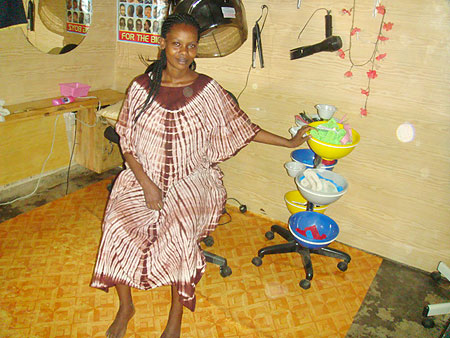Betty Mukeshimana has lived since the age of five without a father, mother and not even a single relative is alive that she knows of. She says that life has been hard ever since the 1994 Genocide against the Tutsi, when she lost both parents and two elder sisters.


Betty Mukeshimana has lived since the age of five without a father, mother and not even a single relative is alive that she knows of. She says that life has been hard ever since the 1994 Genocide against the Tutsi, when she lost both parents and two elder sisters.
"By the time of the genocide, I was only five and Bugesera district was home. It’s during this time that I lost both my parents and two sisters. I started a rough and tough life at an early age, and I believe this is so far the worst I have experienced in my life time,” Mukeshimana says.
She says that theirs was a happy family of five. When the genocide started, her father was the first target of the killers. She narrates that he was taken from home during the day at about 1p.m; noting that even neighbors watched but nobody could rescue him.
"I remember well when my father was taken, but not even my mother could say a word because of fear. The killers were heavily armed with machetes, and some had spears and swords. The next thing we heard was sad news, my father was reported dead and his body abandoned at the next junction nearest to our home.”
She adds that on hearing such terrifying news, they all left the home to join other people who she said had already left their homes to different places like in banana plantations, swamps and valleys.
However, she says that as they tried to link up with others who had fled their homes, her mother and the two sisters were killed.
What was indeed surprising according to Mukeshimana, some people who she thought could come to their rescue, instead ordered for the killing of the mother and her sisters.
"The men killed my mother and the two elder sisters in my presence. I witnessed, I saw and I can never forget seeing when my mother was being stabbed to death. I can not tell why and how I survived, but what I can say is that God helped me for these men to ignore me.”
However, life after she lost the four who were always there for her was not easy. She says that she spent sleepless nights anywhere the night found her. But what she recalls vividly is that she joined other people in a banana plantation who later helped her with food.
"I remember a group of people I joined in a banana plantation, and the reason why it is still in my mind is that they gave me some food at a time I really thought that the end of my life was near. I was starving, since I had taken days without food,” Mukeshimana says.
Life went on with nights in different places, with different people but rotating within Bugesera until a period of three months when she said the genocide was stopped.
Starting life without any one giving Mukeshimana a kick start, was another task that could always make her remember what happened during the genocide.
"I started as a housemaid although I was only five; there was no option but to work for survival. I moved on foot, without shoes all the way from Bugesera to Kibungo in search of a place to live. The only responsibility people offered me was to work as a maid and indeed this was what I could do. I worked for a meal and shelter for quite a long time.”
"In 2008, I felt like working for food and sleep could take me no where, I decided to head to Kigali. It was also hard to start in town, but I managed to look for work at construction sites.”
Mukeshimana says luck knocked on her door as she searched for work. As she moved from one construction site to another, a man requested her to be a house wife.
She said that ‘a step can easily lead to another’ although this was not what she was looking for at the time.
However, Mukeshimana had another battle which she was almost losing until when she invited a third party. Having not gone to school, she could not communicate in English or learn Swahili yet the man was a Kenyan.
"I managed to get an interpreter for easy communication. If we wanted to share ideas, the interpreter could help us until when I picked up and could understand Swahili,” she says.
Mukeshimana is currently a wife with a baby of three weeks. She has also managed to learn salon work and says "after I am fine, I will immediately start work in a salon where I have been getting the skills”.
She also says although what happened left permanent scars, she has to fight hard to ensure that she changes her life from what she has so far gained to a far better life.
And added "like anyone else who also experienced such challenges, working hard is what can revive happiness in life.”
Ends


